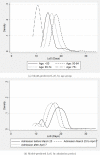Length of Stay in ICU of Covid-19 patients in England, March - May 2020
- PMID: 34007893
- PMCID: PMC8104060
- DOI: 10.23889/ijpds.v5i4.1411
Length of Stay in ICU of Covid-19 patients in England, March - May 2020
Abstract
Introduction: Length of Stay (LoS) in Intensive Care Units (ICUs) is an important measure for planning beds capacity during the Covid-19 pandemic. However, as the pandemic progresses and we learn more about the disease, treatment and subsequent LoS in ICU may change.
Objectives: To investigate the LoS in ICUs in England associated with Covid-19, correcting for censoring, and to evaluate the effect of known predictors of Covid-19 outcomes on ICU LoS.
Data sources: We used retrospective data on Covid-19 patients, admitted to ICU between 6 March and 24 May, from the "Covid-19 Hospitalisation in England Surveillance System" (CHESS) database, collected daily from England's National Health Service, and collated by Public Health England.
Methods: We used Accelerated Failure Time survival models with Weibull and log-normal distributional assumptions to investigate the effect of predictors, which are known to be associated with poor Covid-19 outcomes, on the LoS in ICU.
Results: Patients admitted before 25 March had significantly longer LoS in ICU (mean = 18.4 days, median = 12), controlling for age, sex, whether the patient received Extracorporeal Membrane Oxygenation, and a co-morbid risk factors score, compared with the period after 7 April (mean = 15.4, median = 10). The periods of admission reflected the changes in the ICU admission policy in England. Patients aged 50-65 had the longest LoS, while higher co-morbid risk factors score led to shorter LoS. Sex and ethnicity were not associated with ICU LoS.
Conclusions: The skew of the predicted LoS suggests that a mean LoS, as compared with median, might be better suited as a measure used to assess and plan ICU beds capacity. This is important for the ongoing second and any future waves of Covid-19 cases and potential pressure on the ICU resources. Also, changes in the ICU admission policy are likely to be confounded with improvements in clinical knowledge of Covid-19.
Keywords: COVID-19; England; intensive care; length of stay; survival analysis.
Conflict of interest statement
Statement on conflicts of interest: All authors declare that they have no conflicts of interest.
Figures
References
-
- Flaxman S, Mishra S, Gandy A, Unwin HJT, Mellan TA, Coupland H, et al.. Estimating the effects of non-pharmaceutical interventions on COVID-19 in Europe. Nature 2020;584(7820):257–61. URL: https://www.nature.com/articles/s41586-020-2405-7. 10.1038/s41586-020-2405-7 - DOI - PubMed
-
- Dorigatti I, Okell L, Cori A, Imai N, Baguelin M, Bhatia S, et al.. Report 4: severity of 2019-novel coronavirus (ncov). Tech. Rep.; Imperial College London, London; 2020. 10.25561/77154 - DOI
-
- Ferguson N, Laydon D, Nedjati Gilani G, Imai N, Ainslie K, Baguelin M, et al.. Report 9: Impact of non-pharmaceutical interventions (npis) to reduce covid19 mortality and healthcare demand. Tech. Rep.; Imperial College London; 2020. 10.25561/77482 - DOI
-
- Grasselli G, Zangrillo A, Zanella A, Antonelli M, Cabrini L, Castelli A, et al.. Baseline characteristics and outcomes of 1591 patients infected with SARS-CoV-2 admitted to ICUs of the Lombardy Region, Italy. Journal of the American Medical Association 2020;323(16):1574–81. URL: https://jamanetwork.com/journals/jama/article-abstract/2764365. 10.1001/jama.2020.5394 - DOI - PMC - PubMed
Grants and funding
LinkOut - more resources
Full Text Sources
Other Literature Sources
Miscellaneous

